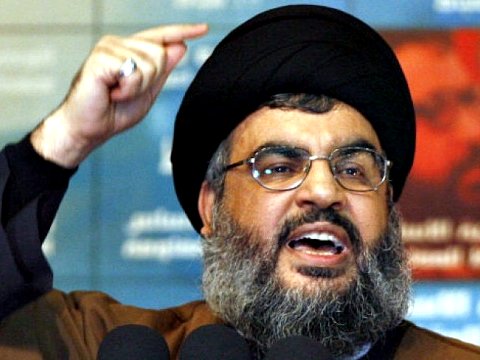Archives
AND MORE...

It's Not You, Islam, It's Us
_____________________

Where's The Outrage?
_____________________

W-A-S-T-E of Time
_____________________

Iran Triples Its Capacity
_____________________
February 29, 2012
Today's 'Freedom Fighters' Tomorrow's Terrorists?
Well, folks, turns out the Syrian opposition council is willing to work with Hezbollah (see below). "If Hezbollah decided to support the democratic process in Syria, there would not be any barrier" to negotiations, said council leader Burhan Ghalioun on Wednesday.
Now there’s one of those famous buzzwords, i.e., “democratic,” frequently used by Arab freedom fighters to capture the West’s attention.
Except if you read on you’ll notice the rest of Ghalioun’s words, especially these: "Hezbollah's greatest popularity in the past in the Arab world was in Syria because it did a glorious job when it stood against Israel…[B]ut the people are now having doubts about it because it has adopted a clear stance, supporting an oppressive regime that is using all kinds of violence."
Got that? Terrorist group, Hezbollah, proxy of another “oppressive regime,” i.e., Iran, has done a “glorious job” of lobbing rockets into (democratic) Israel, kidnapping and/or killing Israeli men, women and children, and committing terrorist acts throughout the world, according to Mr. Ghalioun.
Which begs the question: When Arab/Muslim 'freedom fighters' (often heard on our TV screens yelling "Allahu Akhbar!") use words like ‘democratic’ or ‘freedom’, does anyone ever bother to ask them: the “freedom” to do what?!
The Jerusalem Post | February 29, 2012
Syrian Opposition Council 'Open To Working With Hezbollah'
Council head Burhan Ghalioun says "if Hezbollah decided to support the democratic process in Syria, there would not be any barrier" to negotiations; contradicts earlier remarks that post-Assad Syria would cut ties with Iranian axis.
By Oren Kessler

Hezbollah leader Hassan Nasrallah Photo: Reuters
The opposition Syrian National Council is willing to work with Hezbollah, the council's leader said Wednesday, provided the extremist group does not interfere with democratic change in Syria.
"There are no permanent enmities in politics as there are no permanent friendships. Alliances are built on goals," Burhan Ghalioun told the Algerian newspaper Echorouk.
"If Hezbollah decided to support the democratic process in Syria, there would not be any barrier" to negotiations, he said. "We will not sacrifice Hezbollah if Hezbollah does not sacrifice us as a people and as a cause."
"Hezbollah's greatest popularity in the past in the Arab world was in Syria because it did a glorious job when it stood against Israel," Ghalioun added. "But the people are now having doubts about it because it has adopted a clear stance, supporting an oppressive regime that is using all kinds of violence."
Hezbollah is closely allied with Syrian President Bashar Assad, whose regime stands accused of killing at least 6,000 of its own citizens over the last year's uprising. The Lebanon-based group is a close ally of Iran, and widely viewed as an arm of the Islamic Republic's Revolutionary Guards. Syrian witnesses and activists have accused both Hezbollah and Iran of sending forces to participate in Assad's crackdown.
Ghalioun's latest remarks stand in contrast to comments he made in December that a post-Assad Syria would cut ties with the Iranian axis, including Hezbollah.
"The current relationship between Syria and Iran is abnormal," Ghalioun told the Wall Street Journal at the time. "As our relations with Iran change, so too will our relationship with Hezbollah. Hezbollah after the fall of the Syrian regime will not be the same. Lebanon should not be used as it was used in the Assad era as an arena to settle political scores."
The new comments also contradict remarks made by council member Muhieddine Ladkani, who on Tuesday accused Hezbollah of preventing aid from reaching the Syrian people.
"Hezbollah members are present on the Syrian-Lebanese border to prevent the [transfer] of aid to the Syrians," Ladkani told Al Jazeera television.
Writing last week for the website Salon, Middle East analyst Amira Galal wrote that Hezbollah is finding itself increasingly irrelevant, and may opt to launch a war against Israel in a bid to regain the spotlight.
"It is possible that Hezbollah may look to find solutions to its waning popularity... by pre-emptively launching a strike against Israel," Galal wrote.
Two weeks ago Hezbollah chief Hassan Nasrallah delivered a speech warning, "We have arms and they are increasing [in number]. We have well-known weapons and there are others which are hidden and unknown. We are hiding them because we need to protect our country and prepare surprises for the Israelis."
Original article here.
Log In »
Notable Quotables
"Mr. Netanyahu is one of the most media-savvy politicians on the planet. On Friday he appeared live via video link on 'Real Time with Bill Maher,' taking the host’s alternately sardonic and serious line of questioning with gazelle-like alacrity."
~ Anthony Grant, jourrnalist who has written for many major newspapers and worked in television at Paris and Tel Aviv, interviewing former PM Benjamin Netanyahu on Monday, at the outset of Mr. Netanyahu's new book (more here).
And Then Some
Dangling Israel
March 24, 2022
New Global Leaders
March 23, 2022
Ukraine Can Learn From Israel
January 31, 2022



